Hitler: The Last Ten Days Blu-ray Movie
HomeHitler: The Last Ten Days Blu-ray Movie 
Olive Films | 1973 | 108 min | Rated PG | Sep 22, 2015Movie rating
7.2 | / 10 |
Blu-ray rating
| Users | 0.0 | |
| Reviewer | 2.5 | |
| Overall | 2.5 |
Overview
Hitler: The Last Ten Days (1973)
Adolf Hitler's final desperate days in his Berlin bunker as the Third Reich's vaunted war machine crumbles before the advancing Allied armies.
Starring: Alec Guinness, Simon Ward, Adolfo Celi, Diane Cilento, Gabriele FerzettiNarrator: Alistair Cooke
Director: Ennio De Concini
| War | Uncertain |
| Drama | Uncertain |
| History | Uncertain |
Specifications
Video
Video codec: MPEG-4 AVC
Video resolution: 1080p
Aspect ratio: 1.78:1
Original aspect ratio: 1.85:1
Audio
English: DTS-HD Master Audio 2.0
Subtitles
None
Discs
25GB Blu-ray Disc
Single disc (1 BD)
Playback
Region A (locked)
Review
Rating summary
| Movie | 2.5 | |
| Video | 3.0 | |
| Audio | 3.5 | |
| Extras | 0.0 | |
| Overall | 2.5 |
Hitler: The Last Ten Days Blu-ray Movie Review
Springtime (1945) for Hitler.
Reviewed by Jeffrey Kauffman September 28, 2015If you ever have the pleasure of vacationing in London, and frankly whether or not you have any special affinity for military history or the British response to World War II, one of the coolest things you can visit is the Imperial War Museum and most especially the so-called Churchill War Rooms where you can walk through the labyrinthine hallways of the underground bunker where the Prime Minister and many of his cronies lived, worked and strategized as London lay devastated under the attacks of the German Blitz. Claustrophobic and almost comically old fashioned (yep, there are tons of maps on the walls with pinned flags indicating forces, and even some “shuffleboard” tables that show where various brigades are encamped), the bunker provides an almost palpable time travel experience that makes the incredible victory of the Allies seem, well, all the more incredible. There are no similar tourist “opportunities” available in Berlin, though despite some mistaken beliefs that Hitler’s so-called Führerbunker was completely destroyed in the fall of Germany (it actually wasn't), there isn’t the same public access granted to this less celebrated locale (and it in fact did not survive completely intact, as did Churchill’s underground lair). There’s a curious and perhaps morbid fascination with the final few days of Hitler’s life, when he and his closest acolytes all withdrew to their underground lair, awaiting the inevitable while also perhaps madly insisting (at least at times) that there was nothing to be concerned about. Hitler: The Last Ten Days therefore has incredibly potent source material, but tends to fritter it away with some structural incongruities that regularly interrupt narrative flow and keep things from ever really resonating as frighteningly as they might otherwise have done.
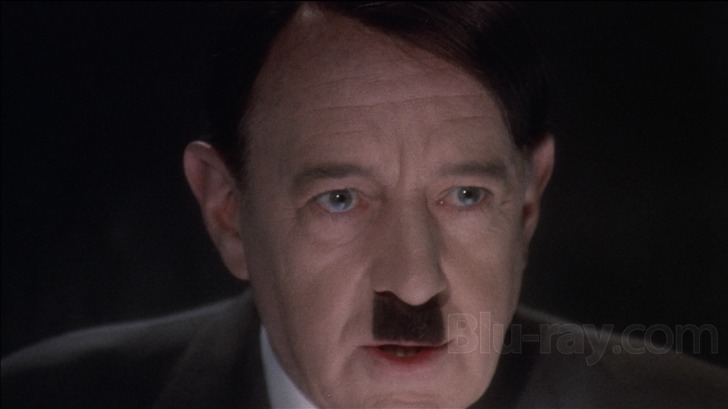
Hitler: The Last Ten Days features not one but two supposed imprimaturs of authenticity, as evidenced by two text card superimposed over the film’s early imagery. The first comes courtesy of historian Hugh Trevor-Roper, then Regius Professor of Modern History, University of Oxford:
This film is the result of careful research. The words spoken and the actions presented are all based on authentic historical evidence.Trevor-Roper had written his own account of this same epochal few days in his 1947 opus The Last Days of Hitler, though by the 1970s when this film was released, Trevor-Roper was already beginning to become ensnared in a number of relative controversies which at least partially tarnished his reputation. The second quote comes from Gerhart Boldt, whose book Hitler's Last Days: An Eye-Witness Account provided the source material for the film’s screenplay:
I personally witnessed most of the events depicted in this film which took place between 20th April 1945 and 12:45 p.m. on 29th April 1945 when I left the fuehrerbunker.An international consortium of screenwriters and director Ennio De Concini attempt to further up the verisimilitude by offering a lot of archival newsreel (and propaganda) footage, as well as a few stylistic bells and whistles like the film lapsing in and out of black and white (and/or sepia tones), but oddly, all of these techniques only tend to point up the artificiality of much of this enterprise. De Concini often attempts to use the “real life” footage as ironic counterpoint to the dramatized goings on, as in one scene where Hitler insists the invading Soviet forces will face their biggest ever defeat in Berlin, which De Concini caps with the famous footage of the Allies blowing up the huge swastika adorning the Zeppelinfeld in Nuremberg (a clip also utilized in a number of other films, including Judgment at Nuremberg).
What this tends to do is divorce the viewer from the narrative, providing a “poke” or two at the on screen participants and providing a bit of “meta” content, but making the film play less like a “ripped from the headlines” quasi-documentary and almost more like something like a vaudeville show built out of interlocking vignettes. While stylistically and structurally the film often falters, there’s little doubt that there’s a disturbing mood that’s present at many moments throughout the film, as a group of doomed characters almost seem to be participating in some ultra dark Noel Coward comedy built around the manners of the privileged elite.
Performances are generally quite good, though understandably hyperbolic at times. Guinness doesn’t partake of the cinematic staple of a “fake German” accent, instead ranting, raving, cajoling and occasionally tenderly whispering in something that’s more or less his native elegant British dialect. Some of the international cast obviously performed their parts in their own native languages, and were later dubbed into English, and the results are not always felicitous. This simply adds to the somewhat clunky feel of a film that unintentionally plays perilously close to camp at times.
Hitler: The Last Ten Days Blu-ray Movie, Video Quality 
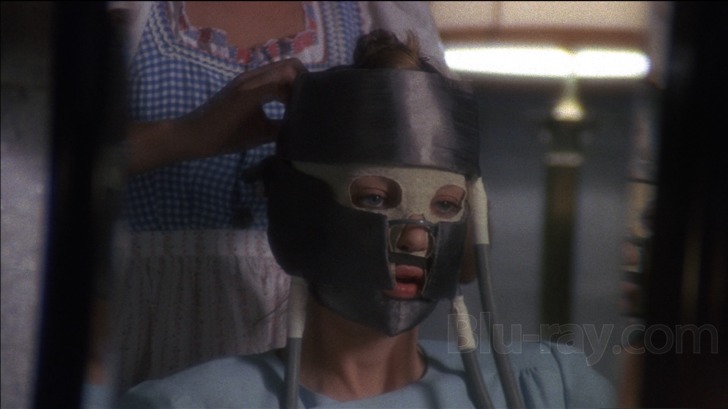
Hitler: The Last Ten Days is presented on Blu-ray courtesy of Olive Films with an AVC encoded 1080p transfer in 1.78:1. Elements have their fair share of age related wear and tear, with quite a few minor nicks and scratches, as well as dirt and the like, dotting the premises. The entire transfer is on the soft side, a tendency which is probably only exacerbated by a rather gritty and heavy looking grain field. Colors are rather nicely suffused when the film is in color, with those redolent Nazi reds popping rather well on the whole. Detail is middling, even in close-ups. The ubiquitous use of stock footage means that the image quality is something like a patchwork quilt at times rather than an organically homogenous whole.
Hitler: The Last Ten Days Blu-ray Movie, Audio Quality 
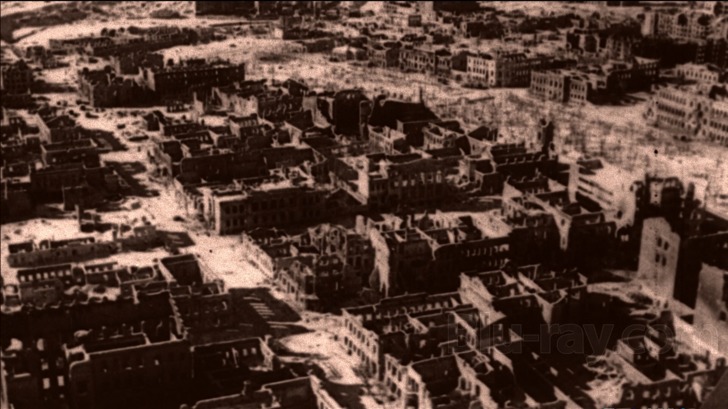
Hitler: The Last Ten Days features a decent sounding lossless DTS-HD Master Audio 2.0 mono track that supports the film's dialogue, occasional narration (by Alistair Cooke, no less) and the kind of odd score by Mischa Spoliansky, which uses copious quotes from a number of classical warhorses, including a hopefully ironic snippet culled from Richard Strauss' Ein Heldenleben. Fidelity is fine, if narrow sounding, and there are no problems with distortion or drop outs.
Hitler: The Last Ten Days Blu-ray Movie, Special Features and Extras 
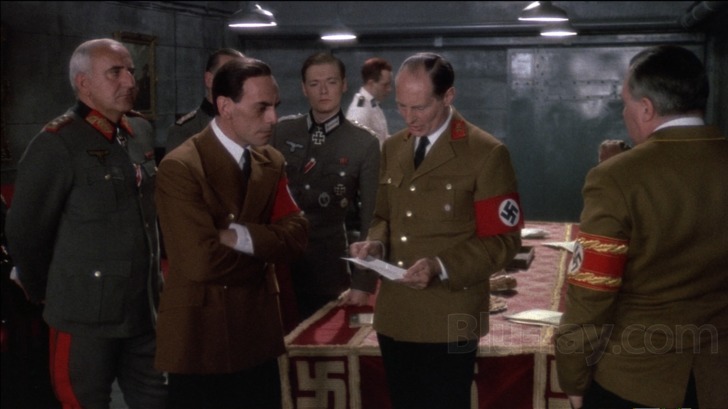
Hitler: The Last Ten Days features no supplementary content of any kind. The main menu offers choices for Play or Chapters.
Hitler: The Last Ten Days Blu-ray Movie, Overall Score and Recommendation 
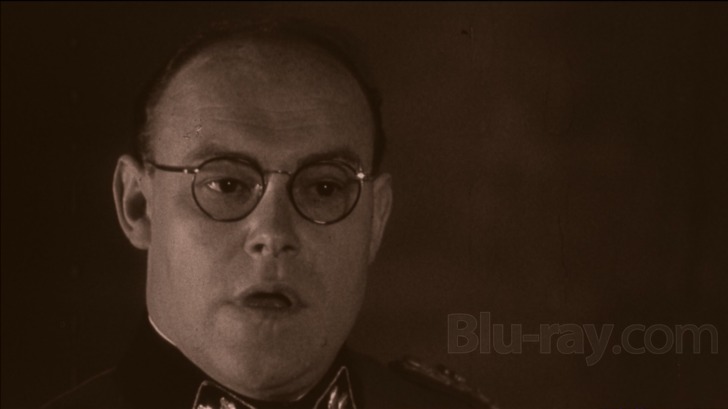
On one level, there's actually quite a bit of really fascinating information sprinkled throughout Hitler: The Last Ten Days. But the stylistic decisions made here, perhaps in an attempt to "modernize" the presentation, only tend to draw the viewer out of the experience at hand, to the detriment of any real connection to the proceedings. Performances are generally quite good, and Guinness makes a surprisingly spry Hitler. Fans of the cast or of this particular period of World War II history may want to check this out as a curiosity, and for those people video quality is acceptable if modest, and audio is very good.
Similar titles
Similar titles you might also like

Judgment at Nuremberg
1961

They Were Expendable
Warner Archive Collection
1945

Time Limit
1957

Gunga Din
1939

Submarine Command
1951

Go Tell the Spartans
1978

Sergeant York
1941

Tobruk
1967

The Keys of the Kingdom
Limited Edition to 3000
1944

The Alamo
2004

A War
Krigen
2015

They Came to Cordura
1959

The Alamo
1960

Khartoum
1966

The Charge of the Light Brigade
1968

Cast a Giant Shadow
1966

Too Late the Hero
1970

The Great Santini
1979

Ten Seconds to Hell
1959

Prince of Foxes
1949
